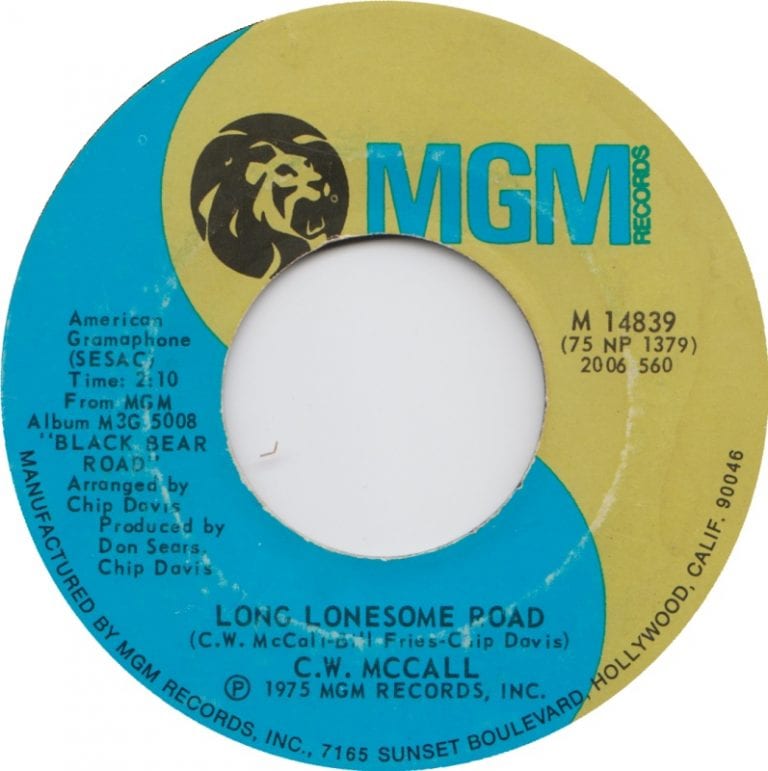Among truck drivers, particularly those who drove during the 1970s and ’80s, C.W. McCall and his CB handle, “Rubber Duck,” point directly toward the No. 1 Billboard country hit of America’s Bicentennial year — the 1976 megahit, “Convoy.”
On the surface, many music historians might describe “Convoy” as a novelty song. But few novelty songs sell two million copies, reach the top of the charts in four countries, cross over to secure No. 1 status on pop charts or serve as inspiration for big-screen spin-offs. “Convoy” took the 1970s trucking world by storm and helped build truck drivers into cultural icons. Little did it matter that C.W. McCall was a fictional character created and portrayed by Omaha advertising executive Bill Fries; McCall still holds a special spot in 1970s nostalgia. His hit song’s continued airplay over four decades later cements his place in the annals of trucking songs.
One could write several articles on the story behind and meanings within “Convoy.” The satire and indirect references to politics, particularly how the government impacted truck drivers at the time, are many. For now, rather than dwelling on C.W. McCall’s biggest hit, let’s take a look at the song on the flip side of the 45 rpm record that producers never released as a single. You might call this song “C.W. McCall’s sentimental side.”
When we finally ran a needle through our copies of “Convoy” that helped fill our Christmas stockings in 1975, a few of us decided to check out the song on “Side B,” as it was labeled. That’s where we found a far less humorous — and far more reflective — song, “Long, Lonesome Road.” Many artists in many genres of music have recorded songs titled “Long, Lonesome Road” or some variation of the words. I’ve never found another version of McCall’s tune, but some struggling musician may have recorded one. When considering the song’s lyrics, it’s a wonder more performers didn’t give it a shot. “Long, Lonesome Road” could mean different things to different people — truck driver or not.
From “Six Days on the Road” to “18 Wheels and a Dozen Roses,” trucking songs are almost never written or recorded strictly for truck drivers. Superficially, listeners may consider a trucking song to be “just” a trucking song. But if you take the wrap off the truck, you’ll almost find something deeper inside.
“Long, Lonesome Road” is no exception.
On its surface, “Long, Lonesome Road” is the story of a truck driver facing life’s challenges in the company of what he refers to as his best friend — his truck. The phrases suggesting a friendship-like bond — “me and my good old friend,” “me and this good old truck,” and “me and this here old truck” — make it clear the truck means more to the driver than simply a tool that makes his life’s work easier. Symbolically speaking, the lyrics transform an inanimate object into a living being. Over time, the truck and driver have become so intertwined that one can’t be recognized without the other.
The combination of truck and driver in “Long, Lonesome Road” have traveled countless miles and overcome more than their share of adversity along the way. The lyrics tell us the driver expects the relationship to last forever — the two will travel “through the wind, rain and thunder, ’til the stormy skies are blue … ’til the sunrise lights the highway — headed home.” And we might assume the truck shares the sentiment.
“Long, Lonesome Road” could be interpreted as a song about a guy who really liked his truck. But I think we need credit Bill Fries and his alter-ego, C.W. McCall, for their ability to play the part of “Rubber Duck” on Side A before maturing on the flip side. We also have to give due credit to Fries for writing and recording a trucking song that anyone can relate to.
What — or who — has helped you along life’s journey? Maybe it’s your driving partner, your carrier or your clients. Maybe it’s the friends, or the countless strangers you encounter ever so briefly when traveling across the country. The “truck” could be seen as a euphemism for a spouse or partner, family, friends, a job or anything and anyone else that’s kept you encouraged. But the truck in “Long, Lonesome Road” doesn’t have to symbolize something so tangible. It might be a stand-in for intrinsic motivators, such as “never-say-die” attitudes or optimism. It might stand for a goal — the pursuit of fame, fortune or whatever else the listener seeks. The possibilities are endless — but I have an interpretation that others may or may not have considered.
I suspect that when Bill Fries wrote “Long, Lonesome Road” he had something spiritual in mind. Again, consider the lyrics. Spiritual themes can be found in phrases like “the load of life is heavy,” “the miles of life are many” and “the road ahead is troubled.” Likewise, the journey through life, the challenges overcome and the sunrise on the horizon can also be interpreted as spiritual thoughts. One can visualize the “big old rig” as the driver’s spiritual guide, one that stands looking over his shoulder as the stormy skies miraculously give way to sunshine.
Considering the public’s infatuation with truck drivers in the mid-1970s, it’s reasonable to suspect that iconic status offered Fries inspiration. After all, in 1976, it seemed everyone wanted to be a truck driver.
Songs are important in culture and in history. One song can capture a snapshot in time or fill a scrapbook that endures time. Those like “Long, Lonesome Road” invite the general population to rub elbows with what they wish, if only briefly, they might experience. These types of songs are the type that becomes hits. “Long, Lonesome Road” never had the chance, as it was relegated to Side B of a megahit that continues to receive airplay. But if released as a single, the song might have captured the public’s attention— at least for the two minutes and 15 seconds into which Bill Fries packed enough sentiment to keep some people intrigued for 40-plus years.
The moral here, as it often is in music, is that no more than a painter “simply” paints a picture does a songwriter “just” write a song.
Next time you’re experiencing tough times and need inspiration, take a cue from C.W. McCall. Change your perspective, and check out what “Side B” has to offer. It might be just what you need.
Until next time, keep the bugs off your glass and the bears off your… tail. This is Rubber Duck on the side. We gone. Bye-bye!
Since retiring from a career as an outdoor recreation professional from the State of Arkansas, Kris Rutherford has worked as a freelance writer and, with his wife, owns and publishes a small Northeast Texas newspaper, The Roxton Progress. Kris has worked as a ghostwriter and editor and has authored seven books of his own. He became interested in the trucking industry as a child in the 1970s when his family traveled the interstates twice a year between their home in Maine and their native Texas. He has been a classic country music enthusiast since the age of nine when he developed a special interest in trucking songs.







